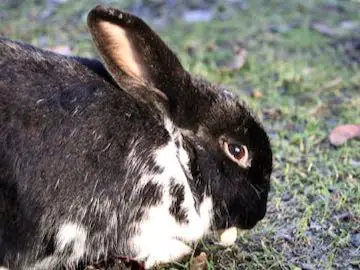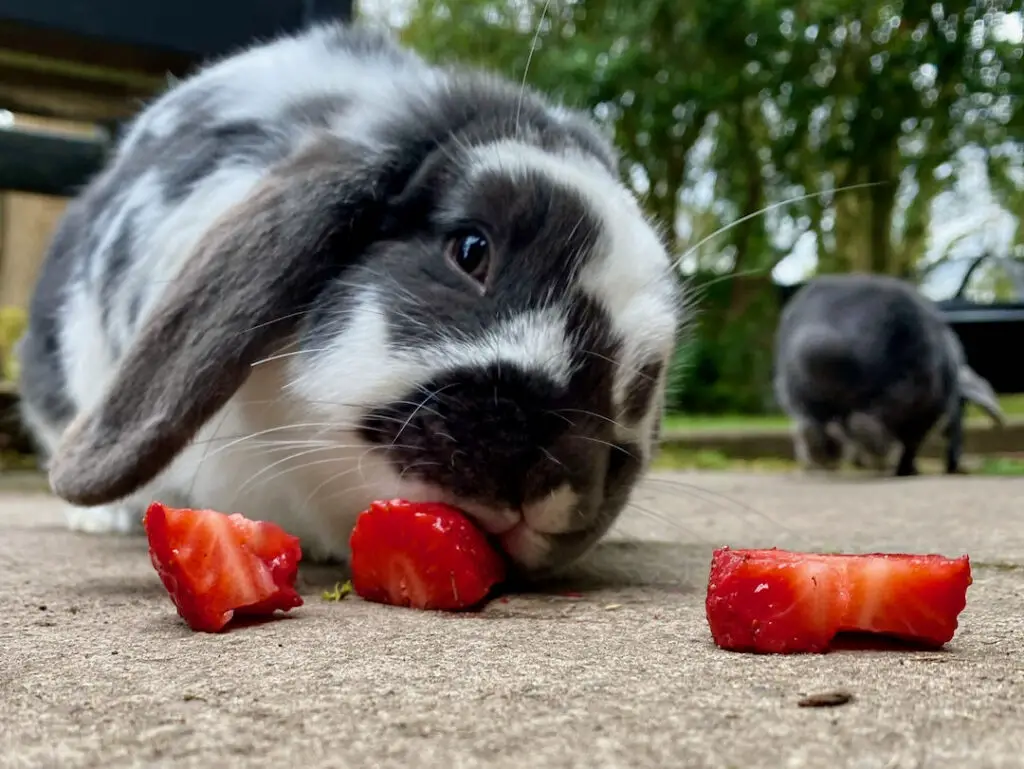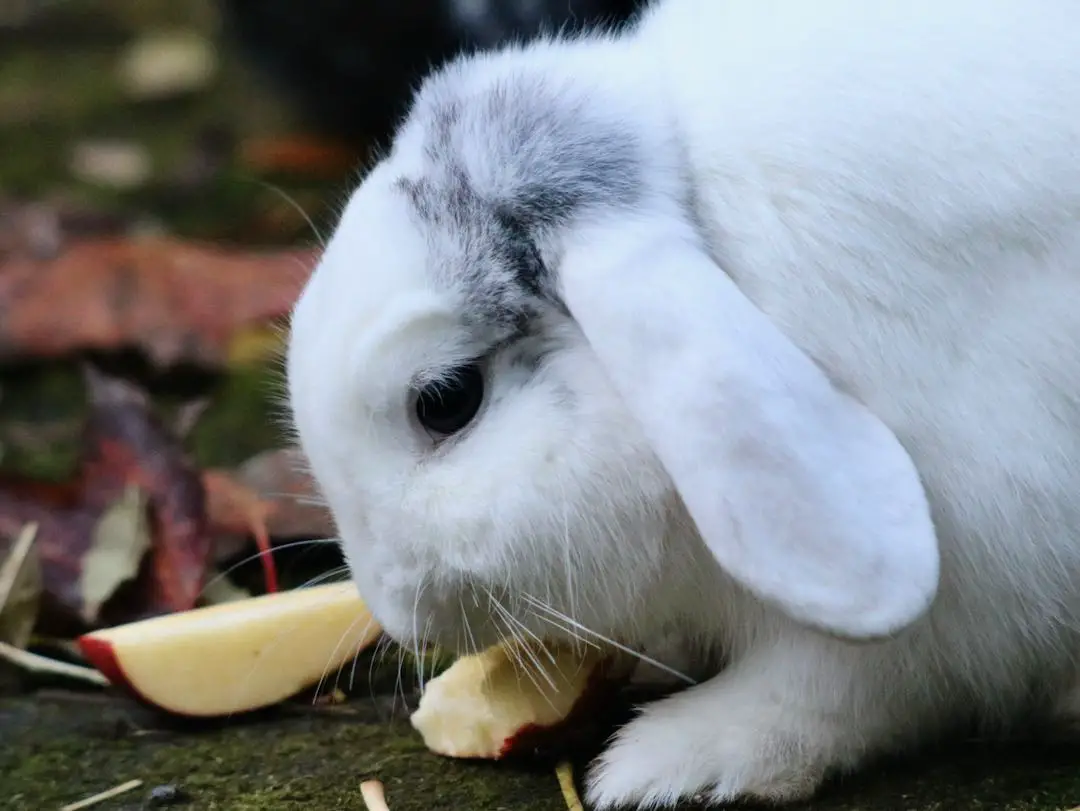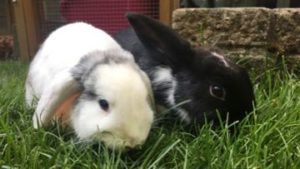If you’re like me, you want the best for your bunnies. Food-wise, that means ensuring the rabbits are getting a healthy diet, with the occasional treat thrown in. The main part of a rabbit’s diet should be hay (read more about why hay is so great for them here). Fruit should be regarded as a treat for bunnies. But you want to be sure that any treats or snacks you give a rabbit are safe.
This is a guide to fruit as a treat for rabbits – what fruit are safe for rabbits to eat, how much fruit should you feed a bunny, and what particular concerns might there be over specific fruit. I’ll go into more detail on each fruit, including portion size, but here’s a quick summary.
What fruit can rabbits eat?
Rabbits can safely eat small amounts of all the following fruit. You can feed bunnies these fruit as a treat (the links take you to more information lower down the post):
- Apples (but be careful with the core – see below)
- Apricots (but be careful with the kernel)
- Banana (and also banana peel)
- Blackberries
- Blueberries
- Cherries (but not the stones)
- Cucumbers
- Grapes (but cut them in half)
- Kiwi fruit
- Mango
- Melon
- Nectarines (but not the stones)
- Papaya (also called pawpaw)
- Peaches (but not the stones)
- Pears
- Pineapple
- Plums (but not the stones)
- Oranges (and also orange peel)
- Raspberries
- Strawberries
- Tomatoes (but only the fruit – not any of the leaves or stalk)
What fruit are dangerous for rabbits?
The following fruit are toxic for rabbits – do not feed them to a rabbit:
(Rhubarb is a vegetable, but is often combined or cooked with fruits, so I’ve included it here).
How much fruit should you give your rabbit?
Give a maximum of 2 tablespoons (about 2oz or 50g) of fruit a day for an adult rabbit (over 7 months) of about 6lb (2.7kg). Consider halving this for rabbits between 7 and 12 months old.
Be careful introducing fruit to younger rabbits – it is best to slowly let them adapt to different greens first, and introducing fruit when they are a bit older.
If your rabbit is overweight or obese, consider giving much smaller portions or no fruit at all.
If your bunny has any gastro-intestinal issues, don’t give any fruit (as always, check with your vet if your rabbit has any particular issues).
Can rabbits eat dried fruit?
Rabbits can eat dried fruit if it is safe for them to eat the fresh fruit.
BUT – the portion size should be much smaller. Dried fruit are deceptive – they look much smaller and weigh less than their fresh fruit equivalents. However, they contain just as much sugar. So giving 2oz of dried fruit to a rabbit is much, much more sugar than giving 2oz of fresh fruit.
Because of this, it is usually best to stick to fresh fruit.
If you do use dried fruit, use the equivalent portion size of fresh fruit as a guide (so if the maximum portion size is 10 grapes, then the maximum portion of raisins is 10 raisins).
What are the problems in giving too much fruit?
Fruit contains a type of sugar called fructose. Just like too much sugar isn’t good for us, it isn’t good for bunnies either.
Fruit is also lower in fibre than a rabbit’s normal diet.
So even though fruit may seem like a healthy choice, it’s like giving your rabbit a sweet.
If your bunny is given the choice of more (unhealthy) fruit, or healthy, full of fibre, hay, they will choose the fruit every time.
This is because rabbits are concentrate selectors.
That means in the wild they ‘select the low fiber, nutrient-rich leaves and immature growth of plants and avoid coarse, heavily lignified, or mature plant tissue. Thus they select the herbage that is highest in protein and soluble carbohydrates and lowest in fiber’. (Manning, 2014, 322).
In other words, bunnies will choose the sweetest, richest, softest food they can find in preference to harder, more fibrous, less sweet hay – even if in the long run this is bad for their health.
Over time, that’s bad for your rabbit, leading to obesity, potentially fatal gut problems, and dental problems (rabbits need to be gnawing on hay and fibre to keep their teeth in top condition).
Bottom line? Don’t give your bunny too much fruit – it’s like feeding a child nothing but chocolate.
Can rabbits eat apples? And can rabbits eat apple pips or seeds?
Rabbits can eat apples safely. However, you may want to avoid giving your rabbit an apple core.
A maximum portion for a 6lb/2.7kg adult rabbit is about ½ a small apple or ¼ of a large apple.
Can rabbits eat apple pips? The science…
Some people worry about the rabbits eating the apple pips (seeds). I don’t think you should be too concerned if your rabbit does, and I’ll explain why, but feel free to err on the side of being cautious.
If you want a more in-depth explanation, I’ve written an article on why rabbits can eat apples safely.
The issue with apple pips is that they contain amygdalin (so do some other seeds, kernels and stones including apricots). Amygdalin is a cyanogenic glycoside. That means it’s a chemical which breaks down into hydrogen cyanide.
Hang on – cyanide?! Isn’t that the poison of Bond movies, Agatha Christie murder mysteries, and other lethal events?
Because of this, you’ll read advice on the internet that apple cores are highly dangerous for your rabbit.
But with anything toxic (and in a large enough dose, just about anything is toxic – even water) the amount matters. How much cyanide is in an apple seed?
Apple seeds contain 2.96 mg/g of amygdalin (original research paper here).
This could theoretically produce 0.174mg/g of hydrogen cyanide (1g of amygdalin can produce 59 mg of HCN – see here for details).
An apple seed weighs about 0.7g. So each seed theoretically can release 0.12mg of hydrogen cyanide.
The lethal cyanide dose for rabbits is 0.66mg per kg of bodyweight (info taken from this authoritative review)
An adult medium sized rabbit weighs from 2-4kg.
So the lethal dose is 1.3 to 2.6mg.
This is 11 to 22 apple seeds.
One apple usually contains no more than about 8 seeds.
BUT – this assumes perfect extraction and degradation of the amygdalin in apple seeds.
The apple seeds have a hard, shiny coating which protects the insides. You could only release the amygdalin if you ground the seeds completely up into fine powder.
A rabbit eating an apple core won’t do that, and neither will their intestines.
Apple seeds have evolved over the centuries to be able to be passed through animals – that’s how the seeds get spread. If doing this was dangerous to the animals, it wouldn’t have succeeded.
In practice, very little amygdalin is likely to be released or broken down into cyanide (which in turn is quickly broken down by the body into safe compounds – there’s no long-term build up).
This can also be seen in looking at what is a dangerous dose of amygdalin. For rats, the lethal dose is 880mg/kg bodyweight. And rabbits are fairly similar to rats in their reaction.
An apple seed contains about 2mg of amygdalin. So on this basis, a 2kg rabbit would have to eat 880 apple seeds. That’s a lot of apple cores!
And, according to a vet specialising in rabbits, there are no known cases of rabbits being poisoned through eating apple seeds.
Bottom line?
Don’t worry about feeding your rabbit apple cores. If your bunny eats one, they are highly unlikely to suffer any consequences. But feel free to be cautious if you prefer.
Can rabbits eat apricots?
Rabbits can eat apricots safely (but don’t give them the kernel/stone).
A maximum portion for a 6lb adult rabbit is about 1/3rd of an apricot (without the stone).
However, avoid giving rabbits the stone, or kernel. Similar to apple seeds, the kernel contains amygdalin, which breaks down into cyanide.
While it is unlikely that your bunny would grind the stone up and then eat it, you may feel safer just not giving it to your rabbit.
Also, your rabbit may choke on the stone.
Can rabbits eat banana (and also banana peel)?

Rabbits can eat banana safely.
For many bunnies, it is one of their favourite foods.
A maximum portion for a 6lb adult rabbit is about 1/3rd to ½ of a banana (without the skin).
Be careful about feeding too much – bunnies love bananas so much that it can be difficult to resist giving it to them.
But, like other fruit, too much banana is bad for your bunny.
Banana peel (and banana leaves) can both also be eaten by rabbits in small quantities – they are not toxic. But your bun is unlikely to appreciate them as much as the peeled banana.
Can rabbits eat blackberries?
Rabbits can eat blackberries safely. Make sure you give ones that are ripe.
A maximum portion for a 6lb adult rabbit is about six blackberries.
Rabbits can also eat blackberry thorns and brambles.
Can rabbits eat blueberries?
Rabbits can eat blueberries safely.
A maximum portion of blueberries for a 6lb adult rabbit is about 30 blueberries.
Can rabbits eat cherries?
Rabbits can eat cherries safely, but you should avoid feeding bunnies the stones. Cherries are a good source of potassium for rabbits, but because they are high in fruit sugars cherries should only be given as treats.
A maximum portion of cherries for a 6lb adult rabbit is about 10 cherries – without the stones.
Can rabbits eat cucumbers?
Rabbits can eat cucumbers safely as a treat, including the skin and the seeds. Check out our more detailed post on bunnies eating cucumber here.
And yes, cucumbers are technically fruit, as they grow from flowers and contain seeds.
Can rabbits eat grapes?
Rabbits can eat grapes safely as a treat, including seeds. You can feed small portions of all grape varieties to your bunny. Grapes contain useful minerals for rabbits including magnesium, potassium and copper as well as some vitamin A. However, grapes are mostly water and fruit sugars, so rabbits can only eat grapes in small quantities to avoid giving stomach upsets or putting on weight. Cut grapes in half to make sure that your bunny doesn’t choke.
We used to cut grapes in half when making toddler snacks for a toddler group. If a young child can choke on a grape, perhaps so can a bunny.
Also, wash the grapes first if you think there might be pesticide residue.
A maximum portion of grapes for a 6lb adult rabbit is about 10 grapes.
Rabbits can eat both red and green grapes, and with or without seeds.
We have a full post on whether grapes are safe for rabbits and what precautions to take. Find out more about can rabbits eat grapes.
Can rabbits eat kiwi fruit?
Rabbits can eat kiwi fruit safely.
A maximum portion of kiwi for a 6lb adult rabbit is about half a kiwi.
Rabbits can also eat kiwi skin safely.
Can rabbits eat mango?
Rabbits can eat mango fruit safely (but not the stone/seed).
A maximum portion of mango for a 6lb adult rabbit is about ¼ of a mango.
Rabbits can eat the mango skin as well.
Can rabbits eat melon?
Rabbits can eat melon safely (cantaloupe, honeydew and watermelon).
A maximum portion for a 6lb adult rabbit is about ½ a thin slice.
Rabbits can eat the rind – but some will turn up their noses at it. The rind is also high in carbohydrates, so should be counted as part of the treat.
Can rabbits eat nectarines?
Rabbits can eat nectarines safely (but don’t give them the stones).
A maximum portion for a 6lb adult rabbit is about 1/3rd of a nectarine.
Can rabbits eat papaya (pawpaw)?
Rabbits can safely eat papaya, also known as pawpaw. You can feed the papaya fruit including the skin to bunnies. Papaya leaves are also safe to feed to bunnies. Papaya provides useful nutrients needed by rabbits including potassium, selenium and vitamin A. Like all fruit, papaya should only be given in small portions as a treat – a maximum portion for a 6lb adult rabbit is about a tablespoon of papaya.
If you want to check out the safety of papaya further, here’s a study checking the effect of papaya leaves on the health of rabbits (they were checking to make sure that papaya didn’t affect the ability of rabbits to reproduce).
Pawpaw leaves can be served to rabbits either in its fresh or wilted state without affecting reproductive parameters assessed in this study. Results of hormonal assay did not reveal any adverse effects due to dietary treatment on the rabbits.
Henry et al. (2018) Hormonal Assay and Reproductive Performance of Rabbits Fed Pawpaw (Carica papaya) Leaves as Feed Supplement. Annual Research & Review in Biology 25:3
Can rabbits eat peaches?
Rabbits can eat peaches safely (but don’t give them the stones), including the skin. You can feed peach to bunnies as a treat, as it is a good source of potassium and vitamin A. Like many other fruits, peach is also high in sugars (which is why it should only be a treat) and vitamin C, which rabbits don’t need. A maximum portion for a 6lb adult rabbit is about 1/3rd of a peach.
Can rabbits eat pears?
Rabbits can eat pears safely (including the stem). You can feed pears to bunnies as a treat as part of a healthy diet including plenty of hay and water. But don’t give your rabbit too much – a maximum portion for a 6lb adult rabbit is about a quarter of a pear.
Pears, like many fruit, are relatively high in sugars, which is why your bunny probably likes pear, but also why too much is not good for them. Too much could lead to diarrhoea or other gut problems.
Pears are a good source of potassium (119mg per 100g), one of the minerals that rabbits need (they also get potassium from other foods, including timothy hay). Pears also, like many fruit, have vitamin C, but healthy rabbits don’t need vitamin C in their diets (find out more about which vitamins and minerals rabbits need in our related post).
Some people remove the pear seeds (like apple seeds, they contain small quantities of amygdalin, which breaks down into a cyanide compound). But the amount is so small (see the section on apples) that you don’t need to worry if your bunny eats a few pear seeds.
Can rabbits eat pineapple?
Rabbits can eat pineapple safely, so long as you stick to the fleshy core. Don’t give bunnies pineapple leaves or pineapple skin, as the sap within these can irritate rabbit intestines. Like other fruit, pineapples are high in sugars, so too much may cause diarrhoea and other problems. Pineapple also contains some potassium, which rabbits need, and is high in vitamin C, which rabbits don’t require. Pineapple is best as a small treat for rabbits.
The juice of pineapples is acidic, and there have been occasional reports that it may help break down furballs inside the rabbit’s intestine (as in this report from the BBC). But the first thing to do if your bunny has a problem is check out the best course of action with a vet.
Can rabbits eat plums?
Rabbits can eat plums safely (but don’t give them the stones).
A maximum portion for a 6lb adult rabbit is about one small plum (without the stone) or ½ a large plum.
Plum stones, like apricot kernels and apple pips, contain amygdalin which breaks down into a cyanide compound, though it is unlikely that a rabbit swallowing a stone by accident would break it down enough for serious harm.
Here’s the science:
A plum stone is about 10g. The amygdalin content is therefore between 175mg (green plums) and 4mg (red plums) (see apples section for references). The maximum theoretical hydrogen cyanide release is therefore between 10mg (green plums) and 0.24mg (red plums). These figures look dangerous – but they are theoretical.
The actual lethal dose of amygdalin is likely to be about 880mg/kg bodyweight (again, see apples section). On this basis, a 2kg rabbit would have to chew up completely 10 green plum stones to reach a dangerous level.
On this basis, it is unlikely that one or even two plum stones would cause any toxic harm.
However, plum stones are also a choking hazard. All in all, it’s best to avoid giving the stone to your bunny.
Can rabbits eat oranges (and also orange peel)?
Rabbits can eat oranges safely.
Rabbits can also eat satsumas and mandarins safely.
A maximum portion for a 6lb adult rabbit is about 1/3 of an orange, or 3 segments.
Rabbits can also eat the peel safely (but this should count as part of the treat). Orange pips aren’t a particular problem either.
Can rabbits eat raspberries?
Rabbits can eat raspberries safely.
A maximum portion for a 6lb adult rabbit is up to 10 raspberries.
Rabbits can also eat raspberries leaves and canes, so if you grow these in your garden, try to rabbit-proof your plants.
Rabbits can also eat dried raspberries (make sure that your rabbits have plenty of access to water) – again, don’t give more than 10. Even though they weigh less and look smaller, they contain just as much sugar.
Don’t give your rabbits canned raspberries. These are usually soaked in highly sugary juices, and are much less healthy for your pet bunny.
Can rabbits eat strawberries?
Rabbits can eat strawberries safely. You can feed strawberries to bunnies, including leaves, as a treat. Rabbits love the fruit sugar (fructose) in strawberries, but too many could lead to obesity or gastrointestinal problems. Strawberries also provide rabbits with minerals such as magnesium, potassium, and manganese. A maximum portion for a 6lb rabbit is 4 medium sized strawberries.

Bunnies not only love strawberries, but they can also eat strawberry leaves and canes (and some rabbits love them), so if you grow these at home, try to rabbit-proof your plants. I am always amazed at how much of a garden bunnies can eat.
As with all these fruit, strawberries should only be a treat given as an addition to the main diet of your bunny, which should be hay and fresh water.
Rabbits can eat dried strawberries, but you need to give much less. Four dried strawberries may not look like a big helping, but the sugar content is the same as four fresh strawberries. Make sure that you provide plenty of fresh water.
And don’t give strawberries (or any fruit) to baby rabbits. They don’t process sweet foods well.
Can rabbits eat tomatoes?
Rabbits can eat tomatoes safely (but do not feed bunnies any of the plant or leaves or stalk). Tomatoes contain useful minerals that rabbits need, including potassium and magnesium. A maximum portion for a 6lb adult rabbit is up to 1/3 of a medium sized tomato. You should feed hay to rabbits as their main diet.
Tomato plants (not the fruit) are toxic (poisonous) for rabbits.
They contain a glycoalkaloid poison called tomatine. It is a similar (but less toxic) poison to solanine, that is found in high quantities in the plant deadly nightshade. (Note that some websites mistakenly state that tomato plants contain solanine – they don’t).
Can rabbits eat avocado?
Rabbits should not eat avocado. Do not feed any part of the avocado plant to bunnies, including the leaves. Avocado contains a toxin which is poisonous for rabbits. This toxin is found in all parts of the plant. Eating avocado may cause the rabbit to have heart and breathing difficulties, and may prove fatal.
How is avocado poisonous to rabbits?
Avocado contains persin, a fungicidal toxin. The persin can be found in all parts of the plant, including the leaves, the bark and fruit.
Persin doesn’t affect humans (except for some with this specific allergy).
But persin is toxic to a wide range of animals, including rabbits.
The effect of persin on rabbits is for the heart to start beating irregularly, and a build up of fluid in salivary glands near the mouth. Breathing may become more difficult. Exposure to persin may prove fatal.
A heart-breaking case from Argentina where 14 pet rabbits were fed some freshly cut avocado leaves shows how dangerous avocado is. Sadly, all the rabbits died [https://doi.org/10.1016/j.toxicon.2019.03.024].
Can rabbits eat rhubarb?
Rabbits should not eat rhubarb.
It is poisonous to them.
The rhubarb plant is also poisonous, including the leaves, not just the fruit.
How is rhubarb poisonous to rabbits?
Rhubarb causes diarrhoea and dehydration in rabbits, along with irritating their mouths. This is from the extremely high levels of oxalic acid the plant contains. Oxalic acid in high doses affects the kidneys of rabbits. Rhubarb also contains emodin and rhein, which are also active compounds with laxative effects.
What is a healthy diet for a rabbit?
A healthy diet for a rabbit consists mainly of unlimited access to fresh Timothy hay, and plenty of drinking water. A handful of greens and an egg-cup of pellets a day is enough.
Failure to stick to this diet can cause all sorts of health problems for rabbits, including with their teeth and their stomachs.
Fruit should be considered a treat, not a main part of the diet.
If you’re interested in what rabbits can and can’t eat, check out our other pages on what herbs rabbits can eat, whether rabbits can eat apples safely, whether rabbits can eat mangetout safely, and why Timothy hay is so good for rabbits.
Also check out our favourite rabbit toys to keep your fluffy bunny friends entertained and interested.


